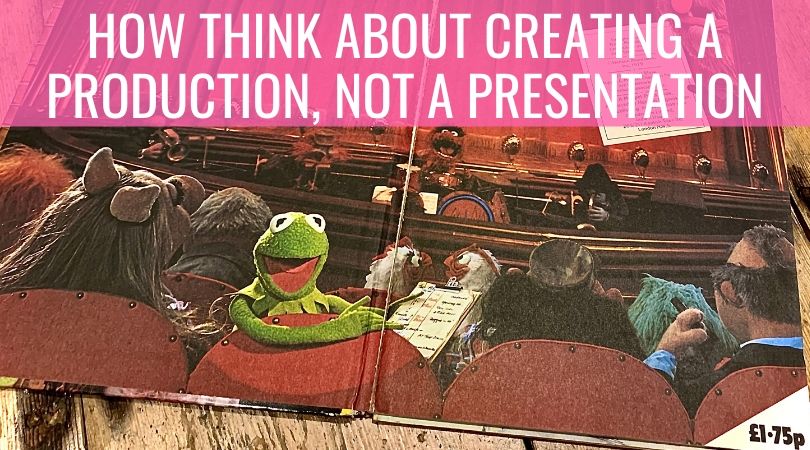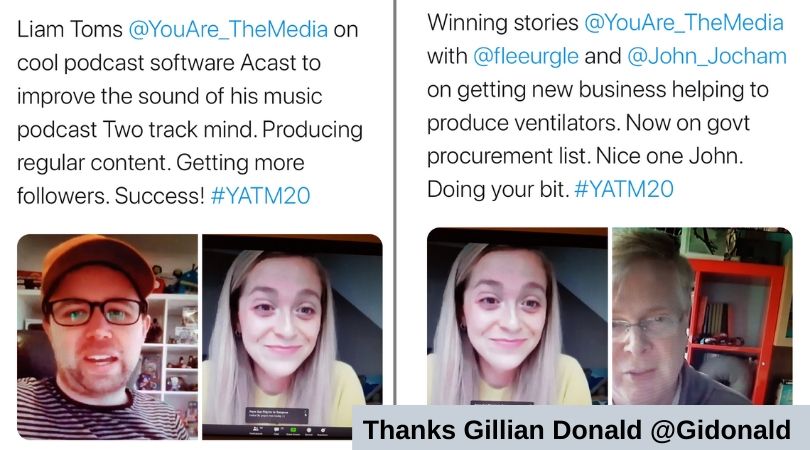Create Productions, Not Presentations

If people are signing up to your Zoom events, it’s your responsibility to make sure that those events have the potential to be a highlight in their week.
Nobody signs up to watching a lifeless presentation or thinly-veiled sales pitch.
The content you produce should play two roles – it should inform and entertain. You can have one without the other, but even in a B2B context, doing both helps you achieve your goals far better.
This article highlights how to use Zoom as an event space, helped along by its very nature as a great medium for combining business and pleasure in one place.
As David Meerman Scott (listen to him on the YATM Podcast here) said in Fanocracy, our “unyielding professionalism can obscure our genuine connections.” By trying to appear ultra business-like what we’re doing is keeping our guard up. So that we can produce content and create an event that truly resonates with and speaks to the people we care about, we need to free ourselves, let our guard down and live a little.
Getting people’s attention is a privilege, not one you should waste by wheeling out the same old tired mantras already featured on LI, focusing on “how your business can thrive after coronavirus.” No one wants to be dictated to. Although we’re not all in the same boat, we are all weathering a similar storm.
We’re Getting Tired In The Zoom Room
Zoom remains a much-needed platform, a means for us to reach out and stay connected to family, friends and business colleagues.
There is however, a sense of weariness creeping in around the video call/event space – being glued to your screen from one hour to the next can be energy-sapping. According to a BBC article, “Our minds are together when our bodies feel we’re not. That dissonance, which causes people to have conflicting feelings, is exhausting. You cannot relax into the conversation naturally.”
That said, there’s still plenty of potential to step up and be delivering your message with the sort of energy and creativity that’ll make you stand out.
Why You Should Reshape What You Deliver
Frame what you share in a way that conveys all the information people need but in a way that keeps it interesting and injects a sense of your personality and values into it.
Jason Miller, who was our first ever speaker at the You Are The Media Conference in 2018 highlights this need to be two steps ahead of others, “As marketers move away from campaigns and towards an always-on content strategy, entertaining at the top of the funnel is going to be essential for keeping your prospects engaged. If you don’t have that element in place, your competitors will.”
Walt Disney also saw the benefit in learning and entertainment…

Proof For You
The fortnightly You Are The Media Lunch Club Online is an event, not just another Zoom call.
It’s not one person stepping up to broadcast and deliver a presentation but a space where everyone can listen and get involved.
By having a central theme around message, creation and audience, people know what they’re going to get.
The YATM Lunch Club Online features a main guest (a well-known name in the marketing industry) and a series of smaller segments that keep the momentum going: One of the audience steps up to share something of note from their side, this has included the business editor from the local paper talking about the sort of articles the regional press are looking for and a view of what life is like in Sweden. One of the few countries where the coronavirus response centres on civic responsibility as opposed to mandatory rules. Fleur Cook delivers the #winning section that is all about life outside of work.
I’d like to think that this sort of format helps it become a live show that both informs and entertains, as well as builds on our sense of community. It’s an hour for people to kick back, learn something new and also be part of a wider conversation. Its unstructured feel and flow are wholly intentional but only achieved through the huge amount of planning and thought that goes into each event.
How To Put More Emphasis On The Production (Not Just The Presentation)
Let me share some ideas with you on making sure the focus is on the “how” and not just the “what” you deliver. Pay attention to putting on a show, not just broadcasting a presentation.
Whilst these ideas can also be applied in a podcast setting, the intention here is to take a look at live video broadcasts.
Find a format.
Expecting someone to listen while you talk at them for 45 minutes non-stop, is a tall order in any scenario. Add in the fact that most of us are holed up at home where distractions abound, it’s a recipe for losing people’s attention.
Find a way to break up how you present information into segments, ideally ones that bring an element of audience participation into play so that they can feel part of the flow of the event. As an example, YATM Lunch Club Online has two sections ahead of the main conversation/topic. This is interspersed with people being encouraged to use the chat function and also ask questions of the main speaker.
Plan a long way ahead.
If you’re looking to make your online events an ongoing feature, scheduling them in fortnightly or monthly, it helps if you plan ahead. It makes sense for your audience to be able to plan their time, see the topic areas you’ll be delving into and choose the ones they want to attend, weeks before you go live.
Whilst you can just cut and paste the event information, so there’s conformity to how you present each event, consider your audience and let them know you’re thinking ahead.
Know what connects with your audience.
By keeping your events regular, you can identify what strikes a chord with others, in terms of topic or individual. Play to your strengths, identify the “hits,” and make that kind of content appear more frequently. For instance, the YATM Lunch Club Online #winning section always sees an uptick in online chat – relatable stories from community members mean more comments.
Ask for help.
If you do everything yourself, the process of creating an event can soon become quite overwhelming. Identify the people you need to reach out to. For instance, you can let others into the Zoom event room and get them to deliver some of the segments.
A production works far better when it’s not just a one-man show. For instance, Richard Burn from Dorset Growth Hub has been a huge support and good friend through all this. He checks the attendee list and welcomes everyone in, as well as asking the questions from the audience to our main guest. Fleur Cook’s #winning section is hers and plays such an important supporting role.

Be appreciative of everyone’s time.
If you say that your event is an hour, keep to that hour. Don’t deviate and expect everyone to be ok with it running over. Follow a plan, stick to a schedule and don’t let it descend into a free-for-all as people will not come back.
The Return For You
There is a return for you from investing in a format that has a “creating a production” element to it.
— You create a platform that has your stamp on it that no one else can replicate
— People trust what they are going to be consuming is right for them and return time and again
— Your own confidence grows
— You have fun in relaying your message
— You become comfortable with something that may have been uncomfortable at the start (i.e. Zoom events may have been something you hadn’t done before)
— You create a sense of community and belonging for others, and it’s that which then inspires you to keep going with it.
Let’s Round-Up
Your challenge today is that once someone has found you, how do you keep them coming back? No one wants to tune into a one-dimensional presentation with delivery that has no heart or soul.
In the words of Otis Redding, “If you want to be a singer, you’ve got to concentrate on it twenty-four hours a day. You’ve got to concentrate on the business of entertaining and writing songs. Always think different from the next person. Don’t ever do a song as you heard somebody else do it.” If you can put your own stamp on the way you do things, you create your own uniquely identifiable space.
Even if it makes you initially feel self-conscious and awkward, step up and dare to entertain, in a way and style that reflects who you are, and how it would be for people to meet you in-person.
Online, as in the real world, recognise your responsibility to be a good host, delivering an experience that’s well thought through and makes people feel involved. It’s putting all these elements together that’ll make you stand out.
LET ME READ THIS ARTICLE TO YOU…
Podcast: Play in new window | Download


